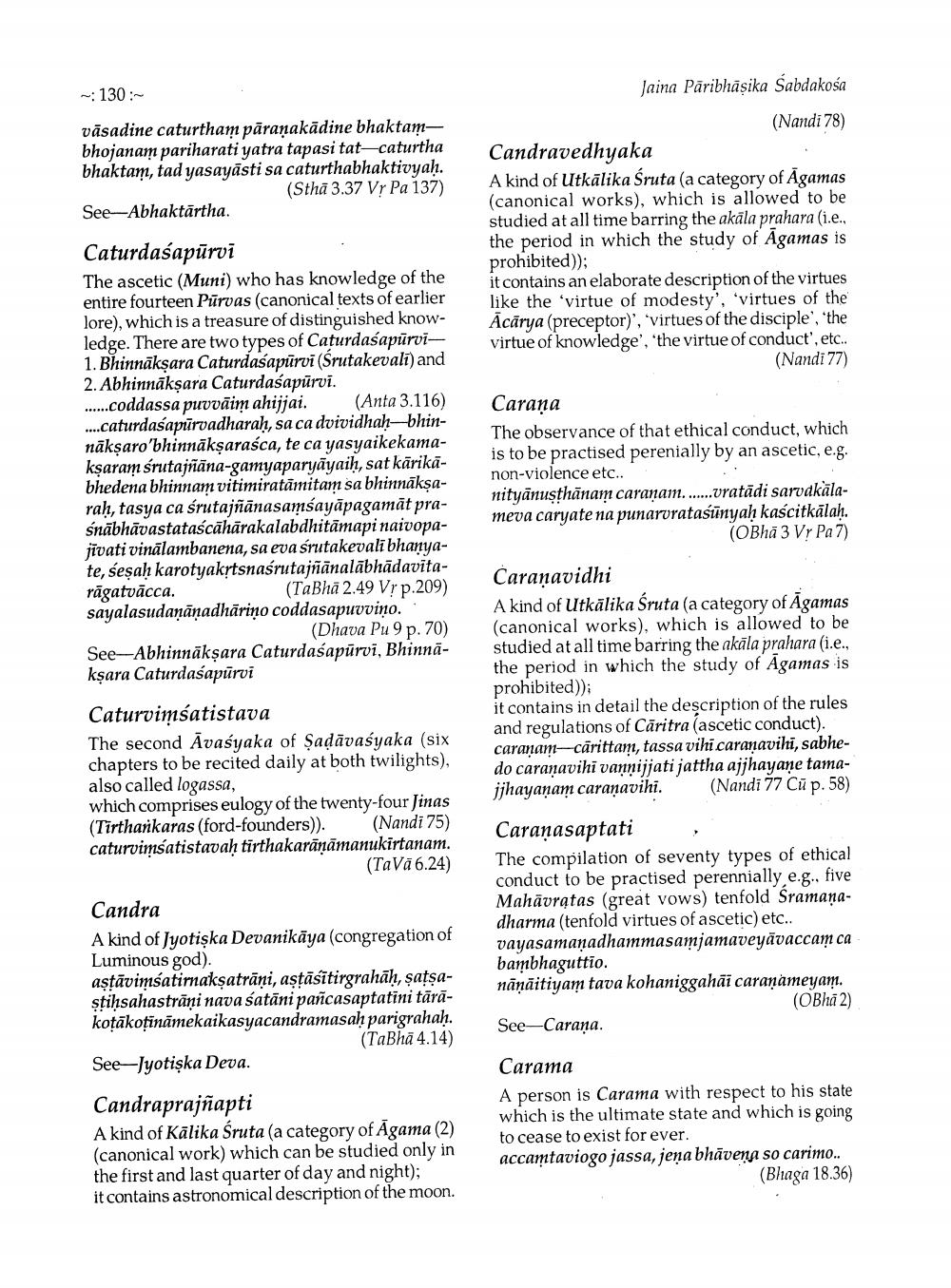________________
Jaina Pāribhāṣika Sabdakosa
- 130:vāsadine caturtham pāraṇakādine bhaktambhojanam pariharati yatra tapasi tat-caturtha bhaktam, tad yasayāsti sa caturthabhaktivyaḥ.
(Sthā 3.37 Vr Pa 137) See-Abhaktārtha.
(Nandi 78) Candravedhyaka A kind of Utkālika Sruta (a category of Agamas (canonical works), which is allowed to be studied at all time barring the akāla prahara (i.e., the period in which the study of Agamas is prohibited)); it contains an elaborate description of the virtues like the 'virtue of modesty', 'virtues of the Acārya (preceptor)', 'virtues of the disciple', 'the virtue of knowledge', 'the virtue of conduct', etc..
(Nandi 77)
Carana
Caturdaśapūrvi The ascetic (Muni) who has knowledge of the entire fourteen Pūrvas (canonical texts of earlier lore), which is a treasure of distinguished knowledge. There are two types of Caturdaśapūrvi1. Bhinnākṣara Caturdaśapūrvi (Srutakevali) and 2. Abhinnākṣara Caturdasapürvi. ......coddassa puvvāim ahijjai. (Anta 3.116) ....caturdaśapūrvadharah, sa ca dvividhaḥ-bhinnākṣaro'bhinnākṣarasca, te ca yasyaikekamakşaram śrutajñāna-gamyaparyāyaih, sat kārikabhedena bhinnam vitimiratāmitam sa bhinnākşarah, tasya ca śrutajñānasamsayāpagamāt prasnābhāvastatascāhārakalabdhitāmapi naivopajivati vinālambanena, sa eva srutakevali bhanyate, sesah karotyakştsnaśrutajñānalābhādavitarāgatvācca.
(Tabha 2.49 Vr p.209) sayalasudaņāņadhāriņo coddasapuvvino.
(Dhava Pu 9 p. 70) See-Abhinnākṣara Caturdaśapūrvi, Bhinnākşara Caturdaśapūrvi
The observance of that ethical conduct, which is to be practised perenially by an ascetic, e.g. non-violence etc.. nityānuşthānam caranam......vratādi sarvakālameva caryate na punaruratasünyah kascitkālah.
(OBhā 3 Vr Pa 7)
Caranavidhi A kind of Utkālika Śruta (a category of Agamas (canonical works), which is allowed to be studied at all time barring the akāla prahara (i.e., the period in which the study of Agamas is prohibited)); it contains in detail the description of the rules and regulations of Cäritra (ascetic conduct). caranam-cārittam, tassa vihi caranavihi, sabhedo caranavihi vannijjati jattha ajjhayane tamajjhayanam caranavihi. (Nandi 77 Cūp. 58)
Caturvimśatistava The second Āvaśyaka of Şadāvaśyaka (six chapters to be recited daily at both twilights), also called logassa, which comprises eulogy of the twenty-four Jinas (Tirtharkaras (ford-founders)) (Nandi 75) caturvimsatistavah tirthakarānāmanukirtanam.
(Tavā 6.24)
Candra A kind of Jyotişka Devanikāya (congregation of Luminous god). aştāvimsatirnakṣatrāņi, astāsītirgrahāh, şațşastihsahastrāņi nava satāni pañcasaptatini tārākotākotināmekaikasyacandramasah parigrahah.
(Tabhā 4.14) See-Jyotişka Deva.
Caranasaptati The compilation of seventy types of ethical conduct to be practised perennially, e.g., five Mahāvratas (great vows) tenfold Sramanadharma (tenfold virtues of ascetic) etc.. vayasamanadhammasamjamaveyāvaccam ca bambhaguttio. nāņāitiyam tava kohaniggahāi caranameyam.
(OBha 2) See-Caraña.
Candraprajñapti A kind of Kālika Sruta (a category of Agama (2) (canonical work) which can be studied only in the first and last quarter of day and night); it contains astronomical description of the moon.
Carama A person is Carama with respect to his state which is the ultimate state and which is going to cease to exist for ever. accamtaviogo jassa, jena bhāveng so carimo.
(Bhaga 18.36)




